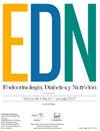Lipid-lowering drug therapy for reducing cardiovascular risk in diabetes. A clinical view of the Cardiovascular Disease Working Group of the Spanish Diabetes Society
IF 1.8
4区 医学
Q4 ENDOCRINOLOGY & METABOLISM
引用次数: 0
Abstract
Patients with type 2 diabetes mellitus (T2DM) managed in both hospital and out-ofhospital settings usually have a high/very high cardiovascular risk, with a high burden of cardiovascular disease. All this justifies that the reduction of low-density lipoprotein cholesterol is the main therapeutic goal in T2DM. However, residual cardiovascular risk is very prevalent in T2DM, and is usually associated with atherogenic dyslipidemia and hyperlipoproteinemia(a); therefore, it is also necessary to reverse these lipoprotein abnormalities to achieve effective cardiovascular prevention. Given the considerable armamentarium of lipid-lowering drugs currently available, the Cardiovascular Disease Working Group of the Spanish Diabetes Society has considered it appropriate to carry out a narrative review and update of the effectiveness of these lipid-lowering drugs in the population with T2DM taking into account their effect on the lipoprotein profile and their potential impact on glycemic control.
降低糖尿病患者心血管风险的降脂药物治疗。西班牙糖尿病学会心血管疾病工作组的临床观点。
在医院和院外治疗的2型糖尿病(T2DM)患者通常具有高/非常高的心血管风险,心血管疾病负担高。所有这些都证明降低低密度脂蛋白胆固醇是T2DM的主要治疗目标。然而,剩余心血管风险在T2DM中非常普遍,并且通常与动脉粥样硬化性血脂异常和高脂蛋白血症相关(a);因此,也有必要逆转这些脂蛋白异常,以达到有效的心血管预防。鉴于目前可获得的大量降脂药物,西班牙糖尿病学会心血管疾病工作组认为,考虑到这些降脂药物对脂蛋白谱的影响及其对血糖控制的潜在影响,有必要对这些降脂药物在2型糖尿病人群中的有效性进行叙述性审查和更新。
本文章由计算机程序翻译,如有差异,请以英文原文为准。
求助全文
约1分钟内获得全文
求助全文
来源期刊

Endocrinologia Diabetes Y Nutricion
Multiple-
CiteScore
2.10
自引率
10.50%
发文量
99
期刊介绍:
Endocrinología, Diabetes y Nutrición is the official journal of the Spanish Society of Endocrinology and Nutrition (Sociedad Española de Endocrinología y Nutrición, SEEN) and the Spanish Society of Diabetes (Sociedad Española de Diabetes, SED), and was founded in 1954.
The aim of the journal is to improve knowledge and be a useful tool in practice for clinical and laboratory specialists, trainee physicians, researchers, and nurses interested in endocrinology, diabetes, nutrition and related disciplines.
It is an international journal published in Spanish (print and online) and English (online), covering different fields of endocrinology and metabolism, including diabetes, obesity, and nutrition disorders, as well as the most relevant research produced mainly in Spanish language territories.
The quality of the contents is ensured by a prestigious national and international board, and by a selected panel of specialists involved in a rigorous peer review. The result is that only manuscripts containing high quality research and with utmost interest for clinicians and professionals related in the field are published.
The Journal publishes Original clinical and research articles, Reviews, Special articles, Clinical Guidelines, Position Statements from both societies and Letters to the editor.
Endocrinología, Diabetes y Nutrición can be found at Science Citation Index Expanded, Medline/PubMed and SCOPUS.
 求助内容:
求助内容: 应助结果提醒方式:
应助结果提醒方式:


